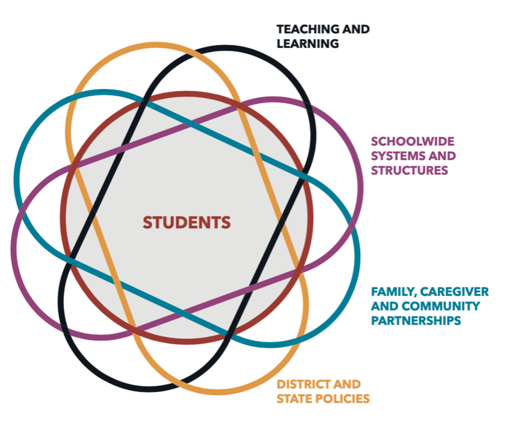
The science of learning and development shows us that “context” – one’s experiences, environments, and opportunities afforded– is the defining influence on a young person’s development. Experiences, physical environments, relationships, and a young person’s various opportunities to express their full genius shape their brain architecture and genetic expression and impact how they learn and develop.
Positive, nurturing, culturally-responsive, identity-safe, relationship-filled, and instructionally-rich learning environments and experiences – in and out of school – can have profound, positive impacts on the person one ultimately becomes. This is why the influx of funds from the American Rescue Plan Act (ARP) is critical in this moment. This is a once-in-a-lifetime opportunity to leverage billions of additional federal dollars to support the creation of developmentally positive and equitable “contexts,” or learning environments, around the country– specifically for the students least well-served by our education system.
Given that COVID-19 has both exacerbated and exposed the deep inequities in our education system, educators can choose to use ARP funding to replace practices, policies and structures that marginalized and denied the opportunity to many students with ones that enable all students to thrive. Our partners at the BELE (Building Equitable Learning Environments) Network provide a framework that goes deeper into the context and supports needed to provide equitable access to culturally affirming, robust learning environments starting with seven Essential Actions that educators and systems leaders can take. The BELE Network has a vision of an education system where every young person’s experience, wellbeing, and academic success are considered in the design of learning environments and patterns of success or failure are no longer predicted by race or any other social or cultural marker.
There has never been a more critical time to reimagine and rebuild an education system that truly serves every student. Both the framework and the Essential Actions are grounded in BELE’s four key pillars, which are:
- Equity & Justice through Targeted Universalism: To achieve equitable outcomes, schools and school systems must partner with students, families, and caregivers to articulate universal goals, engage in rigorous analysis and deep listening to identify and dismantle the structural barriers to reaching those goals for different groups of students, and co-create policies and practices that increase opportunity for meaningful learning experiences and promote collective well-being.
- The Science of Learning and Development: Leaders in education can create experiences that maximize learning and well-being for students and adults by leveraging what we know and continuing to learn about individual and contextual contributions to learning and human development.
- Centering Student Experience: Students can be more fully and equitably engaged as learners and leaders in the design of their learning when we seek to understand and respond to their desires, interests, perspectives, and experiences, using that knowledge to drive decision-making, design, resource allocation, and accountability structures.
- Collaborative Inquiry and Liberatory Design: Students will thrive as learners and as human beings when more adults also engage as learners and work to create adaptive learning systems, collaborating to understand and address complex equity challenges with systematic, data-driven processes to develop, test, and adapt approaches to teaching and learning. Engaging together in shared inquiry and co-design helps to build trust and authentic partnerships among educators, students, families, and communities as it builds the expertise and capacity of all parties. True collaboration requires redistributing power in the visioning, goal setting, and problem identification process as well as in the ongoing co-creation of equitable learning environments.
If you’re wondering how to begin building equitable learning environments where every student can thrive, start with these seven Essential Actions:
- Redesign Teaching & Learning to Transform Students’ Daily Experience: Create learning experiences that prioritize trusting relationships; support an integrated approach to students’ cognitive, academic, social, emotional, and identity development; foster critical consciousness; and foster student agency.
- Redesign Systems & Structures to Create Conditions for Human Thriving: Redesign schoolwide systems, structures, & resources to prioritize relationships, collaboration, & learning.
- Center and Share Power with BIPOC Youth: Prioritize listening to, understanding, and being responsive to the experiences of underserved students, particularly Black, Indigenous, and students of color, to ensure they have real voice, agency, and choice in education transformation.
- Center and Share Power with BIPOC Families/Caregivers & Community Organizations: Partner authentically with BIPOC and other underserved families and caregivers and build deep partnerships with community organizations and local government agencies to ensure aligned opportunities and supports for all youth and families.
- Invest in and Collaborate with Educators & Staff: Set the conditions for adults to be healthy, whole, and prepared to engage in student-centered and anti-racist teaching, to collectively reflect and act on data, and to engage in collaborative inquiry and co-design.
- Review & Respond to Data on Experience, Learning, & Well-Being: Establish student-centered data collection and response systems to routinely gather, disaggregate, and analyze data on students’ feedback on their learning experiences, needs, and interests; data on student learning; and data from families/caregivers; and use these data to adjust practice, policy, and learning environments.
- Leverage Policy & Allocate Resources for Equity & Well-Being: Adopt district & state policies that prioritize well-being and advance equity.
These drivers of practice and policy change that are aligned with the science of learning and development and designed for equity are critical to our shared work of transforming our education system and ensuring all young people thrive.



